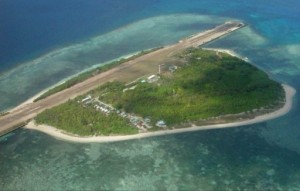PH, US push for peaceful settlement of China issue
MANILA, Philippines—The Philippines and the United States on Saturday jointly expressed concern over unclear claims in the South China Sea and incidents that threaten the freedom of navigation in the disputed waters, an indirect but apparent reference to recent Chinese activities in the area.

This undated photo handout released by the Kayalaan Municipal office on July 13, 2011 shows the island of Kalayaan, which means “Freedom” in the Filipino language, that was created in 1978 mainly to assert the Philippines’ claim to the disputed territory in the Spratlys, a chain of islets in the South China Sea. AFP PHOTO/ Kayalaan Municipal office / HO
At the conclusion of bilateral talks held in Washington D.C. last week, the two allies reiterated that the maritime dispute should be settled peacefully within the bounds of international law, including arbitration, a process that Manila initiated last year against China.
The meeting was held ahead of US President Barack Obama’s visit to the Philippines in an Asia-Pacific swing in April, and amid ongoing negotiations on increased rotational presence of US troops in the country.
“The two sides expressed concern over recent developments in the South China Sea, and emphasized the importance of upholding peace and stability, respect for international law, unimpeded lawful commerce, and freedom of navigation and overflight,” read the joint statement the Department of Foreign Affairs released on Saturday.
The statement, issued following the fourth Philippines-US Bilateral Strategic Dialogue held in the US capital on March 6 and 7, did not specify such “developments” but appeared to be directed at recent incidents in the disputed waters.
These include China’s implementation of a new fisheries law requiring foreign vessels to first seek its permission before exploring in the waters. A Chinese Coast Guard ship was known to have attacked with water cannons two small Filipino fishing boats at the Panatag Shoal on Jan. 27.
Calling for a “diplomatic” solution, the longtime allies also said that claimant nations should clarify their claims, expressing concern that certain assertions made were vague. There was again no clear reference but both the Philippines and the United States have publicly rejected China’s nine-dash line claim, saying that it lacked legal basis.
“The two sides expressed concern over the ambiguity and potential breadth of some claims and agreed on the importance of all claimants clarifying their territorial and maritime claims,” said the statement.
“They underscored that maritime claims in the South China Sea must be derived from land features in accordance with the international law of the sea, as reflected in the United Nations Convention on the Law of the Sea (Unclos).”
China claims almost all of the South China Sea, while Malaysia, Brunei, Vietnam, Taiwan and the Philippines assert partial ownership of some areas. The Philippines, for instance, now calls part of the waters within its exclusive economic zone the West Philippine Sea.
Manila invoked the Unclos in filing its arbitration plea in January. The legal action asks the United Nations to declare China’s nine-dash line invalid and to stop Chinese incursions into the West Philippine Sea. Proceedings are ongoing even as China has refused to participate, asserting its “indisputable” sovereignty over the waters.
The United States, meanwhile, has been a keen third-party observer to the dispute, primarily interested in protecting freedom of navigation in the critical international trade route. It has been wary of Asia-Pacific security, given its ongoing strategic pivot to the region.
Reiterating the common position both sides have long held, the Philippines and the United States also called for the immediate conclusion of a binding Code of Conduct (COC) through multilateral negotiations between the Association of Southeast Asian Nations (Asean) and China to instill discipline in the disputed waters.
“Both sides expressed hope for the expeditious conclusion of a meaningful Code of Conduct on the South China Sea between Asean and China. Both sides expressed opposition to unilateral measures that aim to alter the status quo and that escalate tensions in the region and called on all parties to exercise self-restraint,” read the statement. With a report from AP
RELATED STORIES
Kerry: South China Sea Code of Conduct to ensure regional peace
UNCLOS explained: Why China’s claims in South China Sea are invalid
